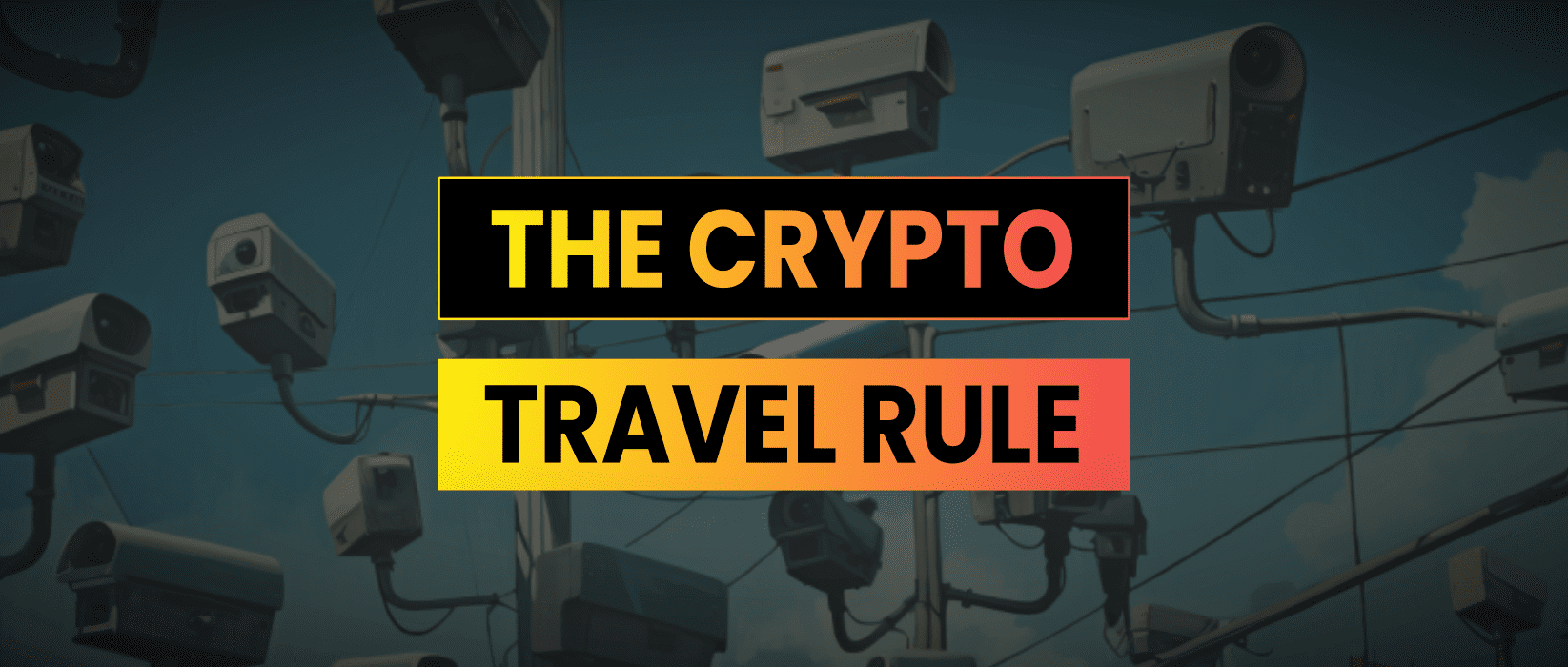From the 1st September 2023 the crypto travel rule will come into force in the UK, the EU is holding a grace period with plans to bring it in towards the end of 2024 and it’s already in place in the US, Canada and other parts of the globe.
- What Is The Crypto Travel Rule
- Who Is Affected By The Crypto Travel Rule
- How Can You Comply
- Creating A Surveillance State
What Is The Crypto Travel Rule
The Crypto Travel Rule is a regulation that requires VASPs (Virtual Asset Service Providers, aka CASPs), to collect and exchange customer information during transactions. It was introduced by the Financial Action Task Force (FATF) to prevent money laundering and financing of terrorism associated.
There is little evidence of terrorists looking to build “weapons of mass destruction” with dogecoin but it was passed into law anyway in July 2022 and will come into effect on September 1st 2023. Under these new regulations, VASPs in the UK will be required to obtain and hold necessary and accurate information for both the sender and receiver of cryptocurrency transactions.
The Crypto Travel Rule is enforced by the Financial Conduct Authority (FCA) in the UK and is part of a wider AML and counter terrorist financing regulatory framework. Every major economy will have a similarly placed local regulator.

Who Is Affected By The Crypto Travel Rule
The Crypto Travel Rule primarily affects Virtual Asset Service Providers (VASPs) such as:
- Cryptocurrency exchanges
- Custodial wallet providers
- Crypto asset management funds
- Cryptocurrency ATM businesses
- Crypto payment processors
- Custodial services for crypto assets
- Cryptocurrency derivatives providers
- NFT marketplaces
- Mining pool operators
These businesses are required to collect and exchange customer information during transactions.
In many jurisdictions including the UK, self-hosted non-custodial wallets are not directly impacted by the rule. In cases where a transfer is made from a crypto service provider to a self-hosted wallet, the provider is not required to send information to this unhosted wallet but must still collect information on the intended beneficiary.
When transacting with self-hosted wallets, UK VASPs are encouraged to collect certain missing information based on a risk assessment. For instance, when the VASP’s customer is the beneficiary of a transfer from a self-hosted wallet, the VASP may collect information about the originator.
The obligation to register with the FCA extends to any crypto asset businesses operating in the UK or carrying out business in the UK. There is some ambiguity but compliance with some form of the crypto travel rule will likely affect all global businesses in the blockchain sector.
How Can You Comply
The travel rule was originally designed for bank wire transfers in the era of fax machines which makes it unsuitable for modern digital assets.
The rule presents challenges to crypto assets transfers, due to the pseudonymous nature of wallet addresses. They do not contain inherent identifying information, making the validation of data accuracy difficult.
To comply with the Crypto Travel Rule, businesses must:
- Verify the identities of their clients and beneficiaries (see table below)
- Maintain a proper record of all transactions, including the sender’s and receiver’s data.
- Monitor transactions for suspicious activities and reporting them to the concerned authorities.
- Collaborate with other VASPs to ensure smooth and secure data transmission between systems.
- Appoint a designated officer responsible for ensuring compliance with the travel rule and conduct regular risk assessments to identify possible areas of risk and non-compliance.
Crypto Travel Rule Information Required
| Type | Originator Information | Beneficiary Information |
|---|---|---|
| Transfers above 1000€ minimum | Name, Address, Account number or unique transaction identifier, Personal document number, Customer identification number or, date and place of birth | Name, Account number/unique transaction identifier |
| Transfers below 1000€ minimum | Name, Account number/unique transaction identifier | Name, Account number/unique transaction identifier |
| Local transfers within UK | Account number/unique transaction identifier (subject to requirement to provide full information to beneficiary virtual asset service provider on request) | Name, Account number/unique transaction identifier |
In practice this compliance get’s tied into KYC/AML procedures where users are required to provide personal information when onboarded to a platform or to raise limitations on an account.
Creating A Surveillance State
The crypto travel rule gives governments the ability to monitor the transaction of digital assets.
The combination of a transparent blockchain ledger with a network of businesses linking addresses to our personal information provides a powerful tool for global financial monitoring. This creates a dangerous precedent in another small step on the pathway to a surveillance state.

The expected emergence of Central Bank Digital Currencies (CBDCs) further exacerbates these concerns. CBDCs give central banks direct control over digital money, which may enhance state surveillance and financial repression. By incorporating blockchain technology, central banks will have the tools to track a currency’s movement from person to person in real-time. This could potentially eliminate the financial privacy that we currently enjoy with cash. CBDCs would run on a permissioned network in a contract which would almost certainly include functions to block or blacklist wallet addresses.
The crypto travel rule is justified as a means of countering the financing of terrorism. Unfortunately I expect it will end up being used for broader purposes by global law enforcement and political agendas.
The recent Canadian lorry strikes, where the government used an emergency act to thwart a protest by seizing bank accounts, can be seen as an example of potential authoritarian overreach. In a similar vein, unrestricted access to crypto transaction data could create a situation where authorities control digital assets based on their arbitrary judgments.

The potential for digital assets creates a double edged sword in that it could create a better, fairer more transparent and reliable alternative to inflating fiat currencies. A separation of state and finance would be a welcome advancement for humanity in my opinion. It could also give nation states more power to monitor, control and destroy at will our ability to trade and transact value.
Financial inclusion and privacy should be a human right and is worth fighting for. Developers working on zk privacy solutions are perhaps the gleaming slither of hope.


